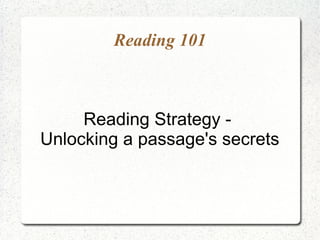
Upper pri activating prior knowledge
- 1. Reading 101 Reading Strategy - Unlocking a passage's secrets
- 2. Learning Objectives To learn the basic structure of all comprehension passages To apply learning strategies in deepening comprehension
- 3. Introduction Do these scenarios reflect you when answering Comprehension Cloze and OE? 1) 'Best' answers given but still marked wrong 2) Answers 'almost' correct but no marks awarded 3) Answers not complete, half mark awarded If the above three scenarios reflect you, then you need a superior method in comprehending a comprehension passage! There's a reason that it's named as such!
- 4. How we read You learnt in the previous lesson that our brains don't read in bits and pieces but in 'chunks'. Our brains are powerful mapping machines – able to develop associations to almost anything. Any information can be associated. Activate your knowledge with these concepts: 1) Level 1 – School Increasin 2) Level 2 – Job g 3) Level 3 – Genes Dfficulty
- 5. Prior knowledge This information is called prior knowledge – what you already know about the topic. Thinking about the information first is the equivalent of giving your brain a warm-up. You are more ready to absorb whatever information is presented to you later when you read. This means that, before you read, you need to activate your knowledge about the subject matter too.
- 6. Activating Prior Knowledge Prior knowledge is activated by: 1) Reading the key words of the questions 2) Scanning for a rough overview Immediately after, write down: 3) your knowledge about the topic 4) what you wish to find out This completes the pre-reading stage – a critical warming-up phase performed to understand any text completely.
- 7. Activating Prior Knowledge & KWL The process can be summed up in a reading strategy called KWL and it represents: K – your knowledge, after reading the question's key words and scanning W – what you wish to know, thinking about the story you are about to read L – what you have learnt, recalling the major facts of the story.
